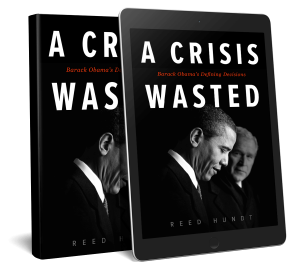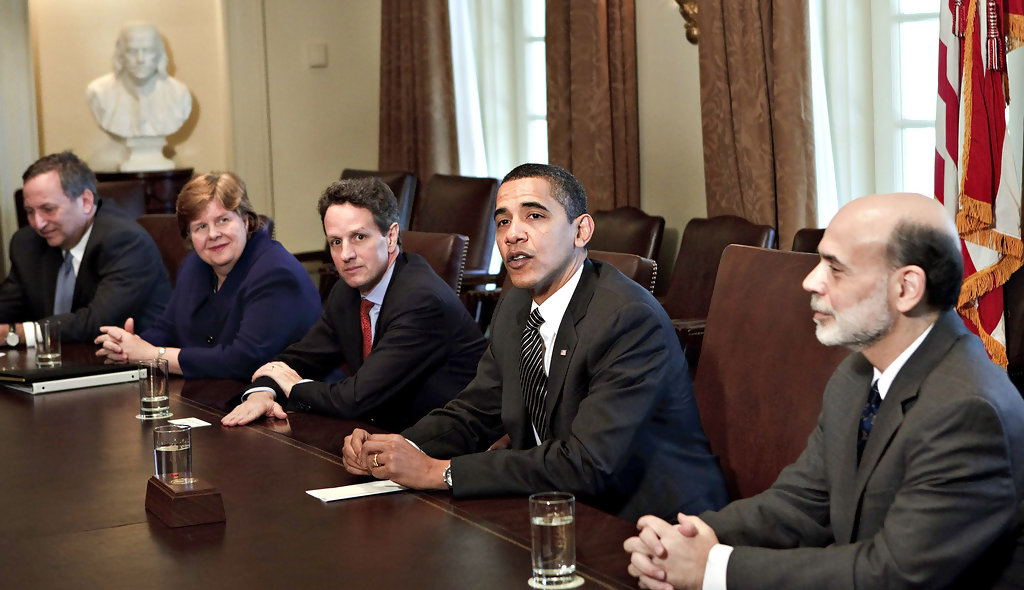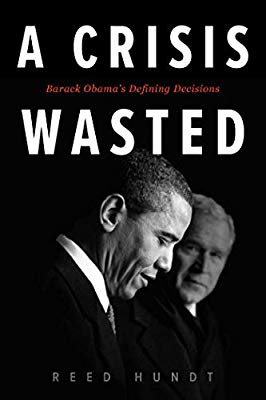Reed Hundt’s A Crisis Wasted
 A Crisis Wasted:
A Crisis Wasted:
Barack Obama’s Defining Decisions
by Reed Hundt
The title of Reed Hundt’s recently published book comes from what one of Barack Obama’s advisors was saying in the fall of 2008. A crisis is a terrible thing to waste because it provides the opportunity for accomplishments which would otherwise be impossible. The thesis of Reed’s book is that Obama was ill-served by his advisors and as a result the government wasted the opportunity for reform that the financial crisis of 2008 – 2009 presented.
The obvious comparison of 2008 – 2009 is to 1932 – 1933. Franklin D. Roosevelt’s New Deal proved that his administration did not waste the crisis it faced upon taking office. The Tennessee Valley Authority, the Securities and Exchange Commission, the Federal Deposit Insurance Corporation, Social Security, and a host of other initiatives which would have been inconceivable prior to 1929 are still with us today.
What do we have now as a result of the financial crisis of 2008 – 2009? First, it is fair to ask what we do not have. We do not have a Great Depression. However, as Reed points out, President Obama wanted to be remembered for more than a disaster avoided.
On the plus side, we do have the Affordable Care Act, an admirable piece of legislation making the nation more humane. We have the Dodd-Frank Wall Street Reform and Consumer Protection Act, which may or may not help prevent the financial system from hurtling the nation toward another Great Depression. We have very little else.
The crisis was to a large extent wasted. Millions of Americans justifiably felt ignored during the years of high unemployment which characterized much of Obama’s Presidency. They were enraged that while the federal government was spending hundreds of billions of dollars to bail out high-living Wall Street bankers whose greed was equaled only by their incompetence, they – Main Street Americans – were losing their homes. In 2016, this once “great silent majority” spoke up loudly by electing as president an extravagantly unqualified man who declared, “I am your voice.” Obama has artfully hidden the devastating disappointment he must feel at being succeeded by Trump.

Not shown: Peter Orzag, Rahm Emmanuel, David Axelrod
Reed and his family were avid supporters of Obama from the beginning. The story Reed tells in this book – based heavily upon interviews with more than four dozen participants in one of the most dramatic events in American history – is told more in sorrow than in anger.
How did it happen? How was the crisis wasted? How did greatness elude the grasp of Obama and his administration?
Space does not permit a full answer to these questions, so let us focus on one aspect of the story. Obama’s economic team failed him. They either did not inform him or they did not succeed in convincing him – the record is unclear which of the two is the case – of the measures necessary to master the crisis. Blaming advisors alone is insufficient. After all, Obama selected them. Not being a Washington insider, he relied too heavily on people with whom he had not previously worked first hand.
Larry Summers is a good example. He held a variety of positions in the Clinton Administration, including Secretary of the Treasury. Summers is a forceful man who is often wrong but rarely in doubt. In January 2008, he recommended that the stimulus package under discussion for the economic catastrophe into which the nation was sinking should be “timely, targeted, temporary.” A nice alliteration, but no way to bring lasting change to a financial system very much in need of it. Luckily for the nation, Franklin D. Roosevelt did not think this way.
On November 25, 2008, President-elect Obama appointed Summers Director of the National Economic Council, Christina Romer, a Berkeley economist, Chair of the Council of Economic Advisors, and Timothy Geithner, Secretary of the Treasury. These three people, assisted by numerous others, were the heart of his economic team.
This team recommended a stimulus package ranging around $800 billion on December 16, 2009. They published its predicted results on January 10, 2009. That same day, using information from the Bureau of Labor Statistics obtained January 9, Nobel Prize-winning Princeton economist Paul Krugman explained for all to read on the Internet that the number the incoming Obama Administration was pursuing in Congress was too low to save the nation from double-digit unemployment.

This was the moment of truth for the economic team. They needed to tell Obama that the stimulus had to be at least $1.2 trillion and perhaps as high as $1.7 trillion. Otherwise, the nation would be shackled with painfully high unemployment for years.
What his advisors actually did tell the President is in dispute. It would appear that they either did not tell him the size of the stimulus that the nation needed – this is not hindsight, Paul Krugman’s article proves that it was known by leading economists at the time – or they did not march into the Oval Office and try as hard as they could to persuade Obama to increase the size of the stimulus. Apparently, they feared that the “t” word – “trillion” — would render the stimulus package a dead letter politically.
Obama’s advisors thus either failed to communicate to the President what they believed or failed to convince him that economic science indicated that what they believed was true. They may have been subject matter experts in economics. However, it appears they made a political judgment. Shoemaker, stick to your last.
Reed’s remarkably rich book provides an account of an inflection point in American history. All future treatments of the 2008 – 2009 crisis – and it will be analyzed endlessly – will have to begin with A Crisis Wasted.
There is much more to be said but not space to say it. In conclusion, this book relies on first-hand accounts to provide an outstanding discussion of how, to paraphrase Bismarck, the sausage is made. It contains valuable lessons, as history is supposed to do, for the future. The contest for the presidency that will occupy so much time and money between now and November 2020 at least in veiled terms will be a referendum on the utility of the response to the 2008 crisis and a competition among prescriptions to address problems left unsolved by that response.


I read this book over the past couple weeks and was totally fascinated by the behind-the-scenes discussions and decisions that shaped the Obama Administration’s policies responding to the economic meltdown that followed the Lehman bankruptcy. Reed’s main thesis is that the Clinton advisory team that joined the campaign after Obama won the nomination shaped the advice and analysis of the problem (and the right responses) mostly from the neoliberal point of view made popular during the Clinton years. The “progressive” or “liberal” possibilities were not advanced … or at least, not advanced so well.
The decisions made between October and January were absolutely critical … and ultimately, they were dispositive, dooming Obama to a very weak recovery (owing to an inadequate simulus) and laying the foundation for the populist outrage that elected Donald Trump.
Reed is a great writer. The description of the scenes when the new cabinet-in-waiting convenes in mid-December in Chicago makes Winter as vivid and bone-chilling as any scene in Dr. Zhivago. While much of the book is reporter-ly, Reed’s inner novelist bursts forth frequently with riffs that are as delightful as they are insightful.
I think this book also lays the foundation for what the Dems will face internally in choosing their 2020 candidate. Will they go with centrists like Biden or Klobuchar? Or with lefties like Bernie? Liberal or neoliberal, that is the question!
BTW, I’m happy to give you my copy if you need/want it.